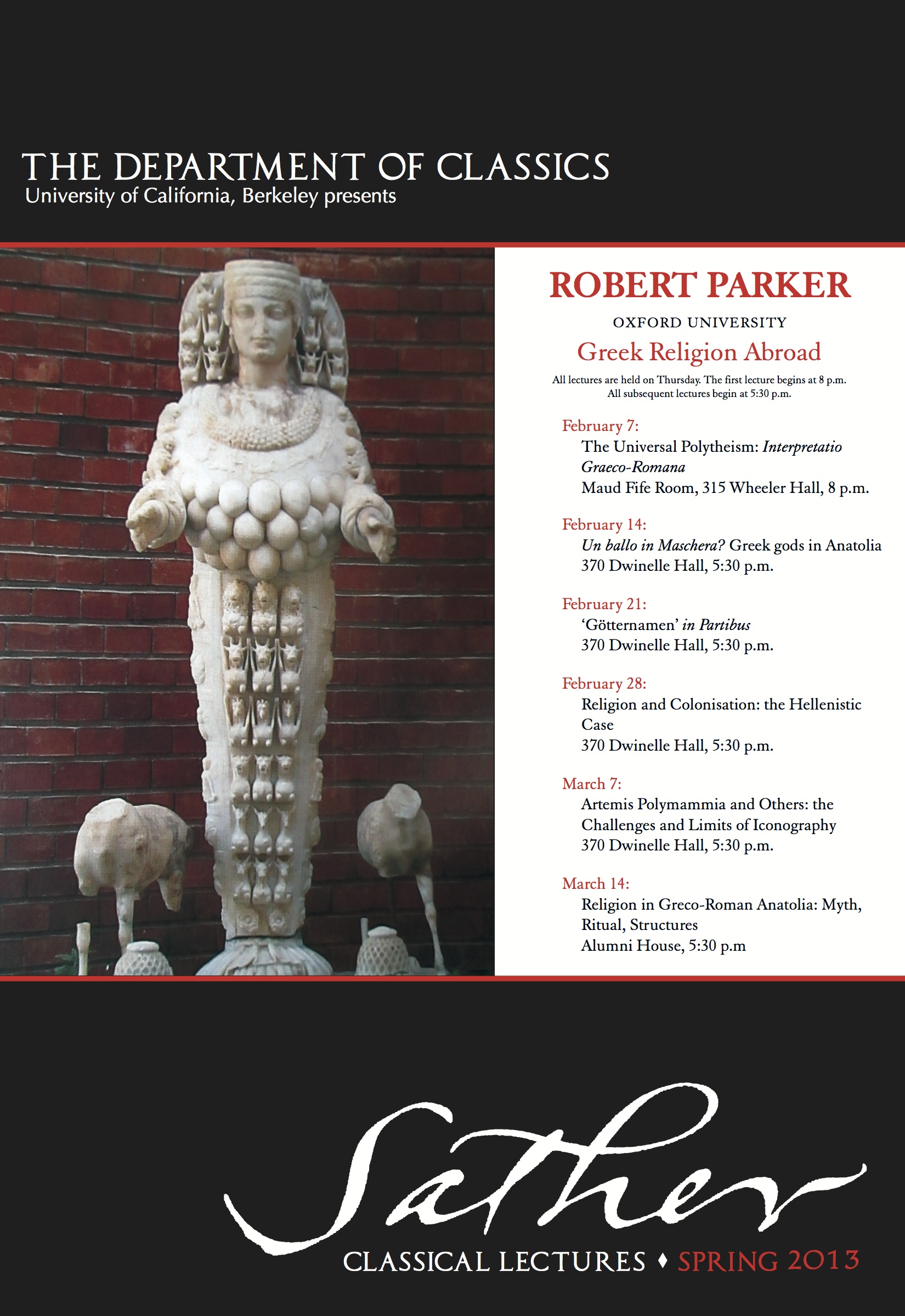The Sather Professor
Robert C. T. Parker
Visiting Sather Professor of Classical Literature, Spring 2013
Wykeham Professor of Ancient History
and Fellow of New College, Oxford University
Greek Religion Abroad
February 7:
Lecture 1: The Universal Polytheism: Interpretatio Graeco-Romana
Maud Fife Room, 315 Wheeler Hall, 8 p.m.
February 14:
Lecture 2: Un ballo in Maschera? Greek gods in Anatolia
370 Dwinelle Hall, 5:30 p.m.
February 21:
Lecture 3: ‘Götternamen’ in Partibus
370 Dwinelle Hall, 5:30 p.m.
February 28:
Lecture 4: Religion and Colonisation: the Hellenistic Case
370 Dwinelle Hall, 5:30 p.m.
March 7:
Lecture 5: Artemis Polymammia and Others: the Challenges and Limits of Iconography
370 Dwinelle Hall, 5:30 p.m.
March 14:
Lecture 6: Religion in Greco-Roman Anatolia: Myth, Ritual, Structures
Alumni House, 5:30 p.m.
More about Robert Parker and his Sather lectures
The 99th Sather Professor is Robert Parker, who has spent a distinguished career at Oxford University, serving from 1979-1996 as Tutor in Greek and Latin languages at Oriel College, before being appointed to his current position as Wykeham Professor of Ancient History and as a Fellow of New College. He was elected a Fellow of the British Academy in 1998.
Professor Parker is one of the world’s leading scholars of Greek religion. He is known for taking an anthropological as well as historical view of his topic, and for treating material evidence, especially the evidence of inscriptions, as a crucial resource alongside the evidence of literary texts. An anthropological approach allied to a profound knowledge of the literary sources was put to work in his first book, Miasma (1983), which dealt in depth with a single, crucial theme of Greek religion: pollution. Despite its thematic nature, Miasma already suggested the historical inflection that has characterized Professor Parker’s later studies. These include such classics as his 1985 article “Greek States and Greek Oracles” or his 1989 article “Spartan Religion,” as well as co-edited volumes on Herodotus and on the Athenian empire. In his second book, Athenian Religion: A History (1996), the concept of polis-religion, which in the 1990s was becoming the predominant interpretative model in studies of Greek religion, achieved its crystallization. This book and its successor, Polytheism and Society at Athens (2005, awarded the Criticos Prize for best work on a Greek subject published in English in that year), convey Professor Parker’s comprehensive mastery of the various aspects of religious life in ancient Athens. Recently, in his 2011 book On Greek Religion, he has addressed Greek religion on a global level, posing fundamental questions such as “What makes a Greek God?” or “In the absence of sacred books, how did the religious beliefs of the Greeks achieve their shape?”
Professor Parker has been invited to give named lectures and other lectures in many countries, including Canada, France, Germany, Holland, Italy, Greece, Sweden, and Denmark. In the U.S. he has given the Robinson Memorial Lecture at Brown, has been a visiting fellow at Princeton, and in 2008 gave the Townsend Lectures at Cornell. He is a Foreign Member of the Royal Danish Academy, an Officier of the Ordre des Palmes Académiques in France, and a Member of the Academia Europea.
About the 2013 lectures
By the second century AD Greek gods, or at least gods bearing Greek names, had spread, along with the Greek language, throughout the Greek East; they were partly carried by settlers but also to a large extent taken up by the indigenous populations. How much of the god’s familiar personality travelled along with the name is always open to debate. The religious systems that emerged were a complicated and variable blend of Greek, indigenous (and Roman). These lectures are an attempt to come to grips with this religious mixing, driven from both sides; the particular focus will be on the abundant evidence from the vast and diverse region of Anatolia, both cities and countryside. An underlying issue is the ‘system compatibility’ between different ancient polytheisms, which made them in a sense into a single universal polytheism.



